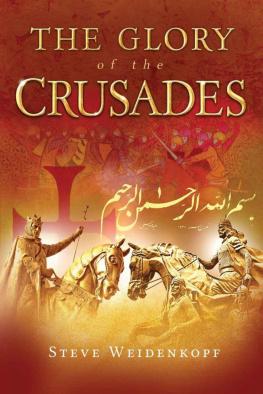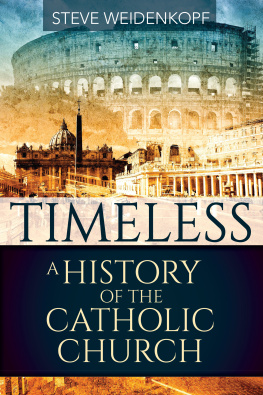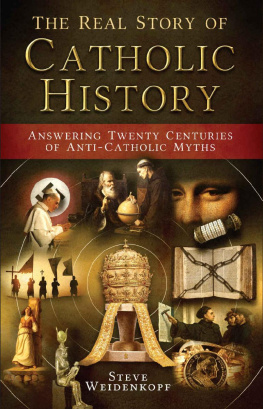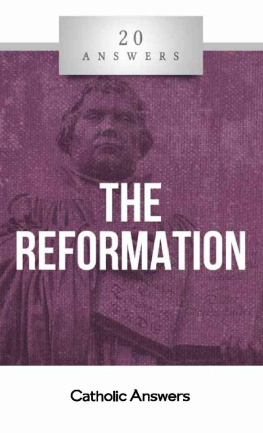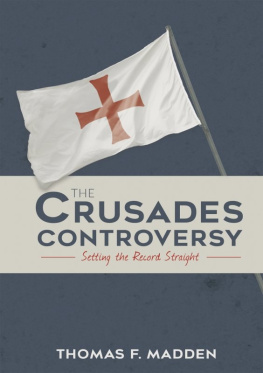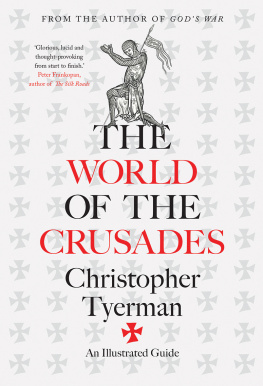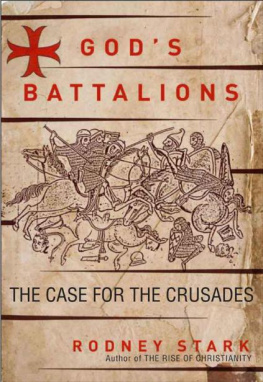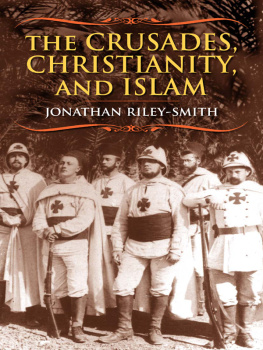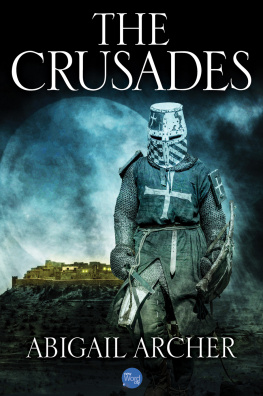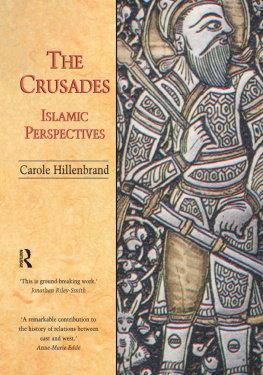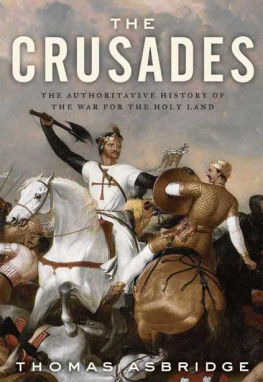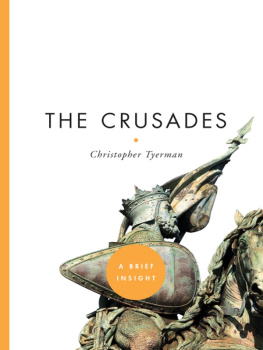Steve Weidenkopf - The Glory of the Crusades
Here you can read online Steve Weidenkopf - The Glory of the Crusades full text of the book (entire story) in english for free. Download pdf and epub, get meaning, cover and reviews about this ebook. year: 2014, publisher: Catholic Answers, genre: Religion. Description of the work, (preface) as well as reviews are available. Best literature library LitArk.com created for fans of good reading and offers a wide selection of genres:
Romance novel
Science fiction
Adventure
Detective
Science
History
Home and family
Prose
Art
Politics
Computer
Non-fiction
Religion
Business
Children
Humor
Choose a favorite category and find really read worthwhile books. Enjoy immersion in the world of imagination, feel the emotions of the characters or learn something new for yourself, make an fascinating discovery.
- Book:The Glory of the Crusades
- Author:
- Publisher:Catholic Answers
- Genre:
- Year:2014
- Rating:5 / 5
- Favourites:Add to favourites
- Your mark:
- 100
- 1
- 2
- 3
- 4
- 5
The Glory of the Crusades: summary, description and annotation
We offer to read an annotation, description, summary or preface (depends on what the author of the book "The Glory of the Crusades" wrote himself). If you haven't found the necessary information about the book — write in the comments, we will try to find it.
The Glory of the Crusades — read online for free the complete book (whole text) full work
Below is the text of the book, divided by pages. System saving the place of the last page read, allows you to conveniently read the book "The Glory of the Crusades" online for free, without having to search again every time where you left off. Put a bookmark, and you can go to the page where you finished reading at any time.
Font size:
Interval:
Bookmark:
The Glory of the Crusades
S TEVE W EIDENKOPF
The Glory of the Crusades
2014 Steve Weidenkopf
All rights reserved. Except for quotations, no part of this book may be reproduced or transmitted in any form or by any means, electronic or mechanical, including photocopying, recording, uploading to the Internet, or by any information storage and retrieval system, without written permission from the publisher.
Published by Catholic Answers, Inc.
2020 Gillespie Way
El Cajon, California 92020
1-888-291-8000 orders
619-387-0042 fax
catholic.com
Printed in the United States of America
Cover design by Devin Schadt
Interior design by Sherry Russell
ISBN 978-1-941663-00-4 hardcover
ISBN 978-1-941663-01-1 paperback
ISBN 978-1-941663-02-8 Kindle
ISBN 978-1-941663-03-5 ePub
To my beloved and devoted wife Kasey
If its half as good as the half weve known, heres Hail! to the rest of the road.
Table of Contents
Acknowledgments
I deeply thank my beautiful and wonderful wife Kasey who supported me in various ways throughout the completion of this work. I also sincerely thank my patient children, Maddie, Maximilian, Thrse, Luke, Jeb, and Martin.
Thanks also to Todd Aglialoro for approaching me to write this book. Dan Lords editorial effort improved this book greatly. Dr. Kris Burns graciously allowed me to utilize space at the Notre Dame Graduate School of Christendom Collegewithout that sanctuary this work would not have been completed. I wish to give a hearty thanks to my friends who read and commented on the manuscript throughout this process and for their unwavering support and encouragement: for my dear friend, Joe Burns, thanks for being my wingman; and Greg Erkens, thank you for your honest critique and thoughtful discussions. I also wish to remember the work of Dr. Warren H. Carroll (19322011), Catholic historian and founder of Christendom College. His many works of Catholic history are inspiring.
Lastly, I give thanks to the Blessed Virgin Mary and to the great St. Bernard of Clairvaux whose intercession throughout this project enabled its completion.
The men of Normandy had faith that what they were doing was right, faith that they fought for all humanity, faith that a just God would grant them mercy on this beachhead or on the next. It was the deep knowledgeand pray God we have not lost itthat there is a profound, moral difference between the use of force for liberation and the use of force for conquest. You were here to liberate, not to conquer, and so you and those others did not doubt your cause. And you were right not to doubt.
Ronald Reagan, Pointe de Hoc, Normandy, June 6, 1984
Author Preface
We have returned to the Levant, we have returned apparently more as masters than ever we were during the struggle of the Crusadesbut we have returned bankrupt in that spiritual wealth which was the glory of the Crusades.
Hilaire Belloc, The Crusades , 1937
In our age the Crusades are described as barbaric, wasteful, shameful, and even sinful. Rarely are they called glorious. This is because the modern world embraces a false narrative about the Crusades. This false story, however much discredited by authentic modern scholarship, remains entrenched in the minds of the masses.
Yet it was not always so. During the Crusading movement these military events were mostly seen in a positive light throughout Christendom, with popes and saints exhorting Catholic warriors to engage in them. Warriors who participated in these armed pilgrimages did so for a multitude of reasons but primarily for the sake of their own salvation. The Crusades emerged from a feudal society that stressed personal relationships founded on honor, loyalty, and service to ones vassal. Crusading knights invoked those virtues as they fought for Christ and the Church to recover ancient Christian territory stolen by Muslim conquerors.
The Crusades also emerged from an age in which faith permeated all aspects of society. This does not mean medieval Europe was heaven on earth or that Christendom was some idyllic utopia. But it was nonetheless an era in which people made radical life decisions because of their faith in Jesus Christ and his Church. Accordingly, the Crusading movement was a Catholic movement. Popes called for them, clerics (and saints) preached them, and Catholic warriors fought them for spiritual benefits. The Crusades cannot be properly understood apart from this Catholic reality.
Sadly, though, too many Catholics today seem more inclined to apologize for the Crusades rather than to embrace their glory.
Perhaps this is because the meaning of glory is not properly understood. The Old Testament can help provide us a proper understanding of glory. After Moses had led the Israelites out of Egypt, they sinned against God by worshipping the golden calf. God wanted to destroy the Israelites for their idolatry but Moses interceded for the people and the Lord relented. Moses special relationship with God included the gift of being in the presence of the Lord in the meeting tent where Moses spoke to God face to face. Moses pleaded with God for his presence to remain with the Israelites on their journey to the Promised Land so that the other nations would see their uniqueness.
Moses also begged the Lord to show him his glory (Ex. 33:18). The Hebrew word for glory used most often in the Old Testament is kabod , which means heavy in weight. To recognize the glory of something, therefore, means to acknowledge its importance or weight. Moses wanted the Lords glory to shine for the people in order that they would recognize the important act of their deliverance from bondage. To recognize the glory of the Crusades means not to whitewash what was ignoble about them, but to call due attention to their import in the life of the Church.
Perhaps by reclaiming the true Catholic narrative of the Crusades we may be emboldened to honor our Lord by proudly bearing the cross against modern enemies that threaten his Church no less than did the followers of Mohammed a millennium ago.
I
An Attack on the Crusades and the Church
The Roman pontiffs and the European princes were engaged at first in these crusades by a principle of superstition only, but when in the process of time they learnt by experience that these holy wars contributed much to increase their opulence and to extend their authority... [then] ambition and avarice seconded and enforced the dictates of fanaticism and superstition .
Johann Lorenz von Mosheim (16931755), German Lutheran historian
Criticizing the Church is not a new phenomenonit is almost as old as the Church itself. Attacks on the Churchs teachings and the persecution of its faithful are a mainstay of its history. However, what is relatively new is the misuse of historical events to undermine the Church and its teachings. This historical attack began in the fires of the Protestant Revolution but in the modern world has become a trite, overused tactic against the Church. Nonetheless, it has proven quite effective, as many people in todays society (including, unfortunately, many Catholics) believe the false history presented by critics. Influenced by the media, Hollywood, and other outlets, popular perception of historical events reigns supreme even when that perception is completely at odds with historical reality.
The Importance of Learning Church History
The historical attack is largely successful because Catholics do not know their own history. This is not to fault the individual Catholic, since Church history is not often a subject taught in schools and universitiesor, at least, it is not often well-taught. Still, knowing our history well helps us know who we are. Knowing our history badly will negatively influence our worldview and cloud our relationship with the Church.
Next pageFont size:
Interval:
Bookmark:
Similar books «The Glory of the Crusades»
Look at similar books to The Glory of the Crusades. We have selected literature similar in name and meaning in the hope of providing readers with more options to find new, interesting, not yet read works.
Discussion, reviews of the book The Glory of the Crusades and just readers' own opinions. Leave your comments, write what you think about the work, its meaning or the main characters. Specify what exactly you liked and what you didn't like, and why you think so.

